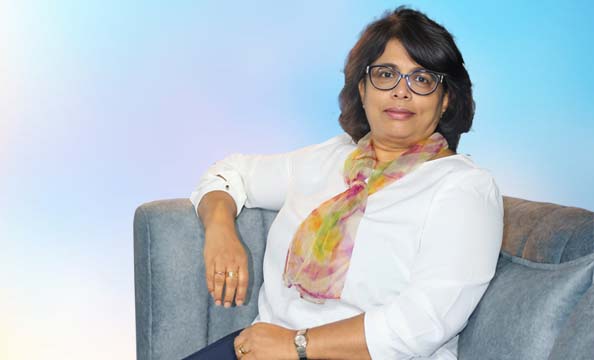In an era marked by unprecedented challenges and rapid transformations, effective leadership has never been more crucial. Ms Gayani De Alwis, Chairperson of the Women’s Chamber of Industry and Commerce (WCIC) Sri Lanka, brings a wealth of experience and insight into navigating the complexities of the current business landscape.
In this conversation, she shares her perspectives on the essential qualities of leadership during turbulent times, the importance of innovation, and the need for a collaborative approach to economic recovery. Gayani De Alwis emphasises the pivotal role of small and medium enterprises (SMEs) and women entrepreneurs in particular, in driving growth and resilience in Sri Lanka’s economy. Join us as we delve into her visionary insights and explore how businesses can adapt and thrive in the face of adversity.
Q: You have a multifaceted career as the Chairperson of the Women’s Chamber of Industry and Commerce Sri Lanka and as an independent non-executive director of several companies. What leadership qualities and strategies should Sri Lankan companies have followed during the past few challenging years?
A:This is a pertinent question to start with. Over the past four to five years, Sri Lankan companies have faced significant challenges, especially during the pandemic, which became a global issue. For two years, we experienced severe disruption from the economic meltdown. However, I always say that within every crisis, there are numerous opportunities waiting to be discovered. Companies that have been successful during these times are those that have actively sought out and embraced these new opportunities. If leaders can guide their teams to shift their focus from the crisis and provide hope, they can foster a mindset geared towards innovation and resilience.
Q: Innovation and adjustments are vital during uncertain times. What are your thoughts on their role in this context?
A:Absolutely, innovation is essential in a crisis. The old ways of thinking and operating simply do not suffice anymore. It’s crucial to exploring new opportunities, even if they are not breakthrough innovations. Companies need to implement incremental improvements, focusing on cost efficiencies and improving responsiveness during a time when market demand is dwindling, and consumers were looking for different ways to live their lives. The role of a leader here is to open the minds of their teams and encourage creative thinking. Smooth seas never built skillful sailors, so its important to build capacity and confidence of your team to navigate through turbulent waters.
Q: You mentioned the importance of opening the minds of your team. What specific leadership qualities facilitate this process?
A:Many leaders tend to prefer like-minded individuals in their teams, but I believe in surrounding myself with people who are diverse and more skilled than I am. We cannot be masters of every thing; instead, we should seek out team members with diverse skills and capabilities. This creates a complementing team that provides different perspectives. Opening their minds involves facilitating and enabling them to think differently. This can only happen in an environment where learning is encouraged. Empowering team members without micromanaging, while providing them with resources, is essential. Leaders should step back and observe how their teams take charge and innovate, which instills hope and fosters a sense of ownership.
Q: Given the recent restructuring and reforms in Sri Lanka, what do you foresee for the local market and business environment over the next five years?
A: The situation is undoubtedly difficult. We have an arduous journey ahead. With our national debt surpassing $92 billion, which is much greater than our annual GDP, we can either wallow in despair or focus on understanding the opportunities available to us to get us out of the woods. As a nation, we need to ask ourselves whether we are genuinely seeking innovative and creative solutions. Are we holding our politicians accountable, similar to how we would in a company? The private sector has a significant role to play in this context. It’s crucial for us to lead by example, supporting government initiatives that are moving in the right direction, while also advocating for necessary course corrections. I remain hopeful that if we all work together as one team, we can turn this situation around, but we must be prepared for the long haul.
Q: With the trend of local businesses expanding into global markets, how can companies ensure they maintain a strong presence in both contexts?
A: Over the past two to three years, SMEs have been the hardest hit, representing 90% of our total business landscape. In the case of women-owned and led SMEs, they only make up about 25% of the SMEs. There is a pressing need to support this demographic. Various strategies have been adopted to alleviate their burdens, including innovative structural arrangements. However, both the SME community and we as individuals must also be willing to change our approach. We need to be bold and creative, as the competitive landscape has shifted. Today, it’s not merely the big fish that eats the small fish; it’s the fast fish that will outpace the slow. Therefore, companies must be agile to quickly respond to market needs and expand into oversees markets. As an island nation, we sometimes adopt a localized mindset, which limits our awareness of global trends and the reach.
As part of the Women’s Chamber, we are dedicated to engaging and empowering women owned businesses, particularly in the MSME sector, to enhance their capacities and prepare them for export readiness. We have a vital role to play as associations, individual companies, and civil societies to support this critical group, as a thriving MSME sector can significantly contribute to the economic recovery. We must foster a global orientation and develop the agility to adapt to the evolving demands of both local and international scenarios.


